|
|
|
Sort Order |
|
|
|
Items / Page
|
|
|
|
|
|
|
| Srl | Item |
| 1 |
ID:
183484
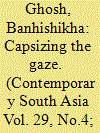

|
|
|
|
|
| Summary/Abstract |
During the current pandemic, gender non-conforming communities (GNCs) in India have been engaging themselves as critical citizens through a demonstration of civic engagement and social responsibility. This paper, based on narratives, documentary evidence and media reports, demonstrates how GNC volunteers are playing a decisive role in accentuating the virtues of representative democracy by serving as ‘monitorial citizens’ in India. It also considers the social dynamics involved in GNC people becoming ‘monitorial’ in a heteronormative society. This means consolidation of their community network and its strategic and instrumental use not just to serve their community, but also a diverse cis-gendered population consisting of migrants, homeless, marginalized, and the poor. In this process, they are creating a shared sense of belonging, based on mutual experiences of discrimination, with other communities that are not categorized as gender non-conforming. Their actions also challenge the normative standards set by mainstream society and create an alternative to existing power hierarchies by capsizing the heteronormative ‘gaze’.
|
|
|
|
|
|
|
|
|
|
|
|
|
|
|
|
| 2 |
ID:
183486


|
|
|
|
|
| Summary/Abstract |
The agriculture sector in India is marred with several problems, which have resulted in farmers’ distress. To address the distress of the farmers, both Central and State Governments of India implemented agricultural debt waiver schemes (ADWRSs) as major policy interventions in recent years. These schemes differ in terms of coverage of the farmers and lending agencies. However, all of them aim to benefit millions of small and marginal farmers of India. The implication and evaluation of these schemes has invited serious criticisms from both policy makers and researchers. It is true that these schemes have created fiscal pressure on the implementing governments. In addition, some degree of corruption has become an integral part of the schemes. However, given the extent of the indebtedness of the farmers, waivers may also be crucial as a temporary measure to mitigate agricultural distress. This paper explores the debate and examines the criticism of the ADWRSs from various quarters. We have found that the majority of arguments against the debt waiver schemes widely accepted amongst bankers, policy makers and even economists are based on perceptions and are not backed by sound economic logic and analysis.
|
|
|
|
|
|
|
|
|
|
|
|
|
|
|
|
| 3 |
ID:
183482
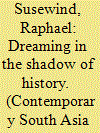

|
|
|
|
|
| Summary/Abstract |
Spatial mobility is often considered on large geographical scales: people move from distant villages to global cities, they migrate from one country to the next, or even to a whole new continent. Such large-scale migration comes with shifts in economic position, social status and cultural exposure, shifts that condition new figurations of belonging – or so the argument goes. In contrast, I ethnographically follow the looping movements of three young men in Lucknow who aspire to migrate but remain stuck, who find a whole new world by crossing the river, whose small steps reflect big dreams. As the world grapples with ‘lockdowns’ and ‘stuckedness’ in the Covid-19 pandemic, I sketch their aspirations, mental maps and the material restraints that condition their trajectories. Through them, I demonstrate how looping micro-mobilities – cruising through the night, dancing on stage, riding one's bike – can be as effective in fostering new figurations of belonging as the grand movements emphasized in literature on migration. I further explore which spaces enable and contain such micro-mobilities, rediscovering the potency of urban settings to make people feel at home and out of place in small but important ways.
|
|
|
|
|
|
|
|
|
|
|
|
|
|
|
|
| 4 |
ID:
183485


|
|
|
|
|
| Summary/Abstract |
Marriage and family are central aspects of life for women in Sri Lanka. The failure to marry or the absence of a family is considered a ‘lack’ in a woman’s life. As a result, we have come to notice how women put up with domestic violence and protect the perpetrator as he is her ‘husband’. Although legal statutes to deal with domestic violence exist, in practice they have limited effect. In attempting to understand the life of women after marriage in rural Sri Lanka, I engaged in an ethnographic study. In the course of the study, I have explored the suffering women undergo and the avenues that they take to resolve the suffering caused by marital conflict. Sorcery is a key tool they use to alleviate their suffering. In this article, using a case study of a marital dispute that spanned a period of fourteen-months in a rural Sinhala village in Sri Lanka, I highlight how women build their capacity to cope with marital conflict and alleviate suffering.
|
|
|
|
|
|
|
|
|
|
|
|
|
|
|
|
| 5 |
ID:
183483
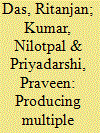

|
|
|
|
|
| Summary/Abstract |
This article examines two simultaneous dynamics in contemporary India: the development of new urban spaces, and an intensification of Hindu nationalism (Hindutva). Examining the case of Noida (a township adjacent to Delhi), this article suggests that the entrepreneurial mode of urban development [Harvey 2006. Spaces of Global Capitalism. New York: Verso] has restructured local spaces, which in turn may give rise to rival attempts at group making, seeking to recreate exclusive identities out of choice and resentment to mobilise political action. Such rival attempts may enable Hindutva to entrench itself in local milieus through multiple modes, including the soft mode of ‘neo-Hindutva’. Overall, the article outlines the dynamic association between new urban processes and exclusivist/nativist forms of politics in contemporary India.
|
|
|
|
|
|
|
|
|
|
|
|
|
|
|
|
| 6 |
ID:
183481
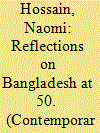

|
|
|
|
|
| Summary/Abstract |
The pandemic meant the celebrations of Bangladesh's 50th year of independence in 2021 were more subdued than hoped. This Viewpoint article reflects on the messages and the silences emerging from the international articles and online conferences marking the anniversary. Bangladesh's long experience on the frontlines of untrammeled globalization and climate change means it now has lessons, both good and bad, for the rest of the world. Compared to contemporary India or Pakistan, Bangladesh has made great progress, and international articles focused heavily on its economic development and social indicators. There was little, if any, attention to any other aspects of the nation (culture, history, politics), reflecting Bangladesh's continued status as the world's ‘Aid Lab'. Scholars and observers noted that the sounds of economic success often drown out discussion of the problems, including not least inequality, social injustice, and the recurrent problem of violence against religious minorities. The article concludes that the clearest sign of Bangladesh's success is in how seriously it takes the issue of women’s rights. Discussions about Bangladesh at 50 highlighted how much its success owes to the hard labour, ingenuity and resourcefulness of its women, a matter both worthy of celebration and a lesson for the world.
|
|
|
|
|
|
|
|
|
|
|
|
|
|
|
|
| 7 |
ID:
183488
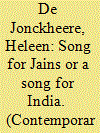

|
|
|
|
|
| Summary/Abstract |
This research note studies the interaction of religiosity and national sentiment on the popular level of Jainism in dealing with the COVID-19 crisis. It does so through a case study of a Jain popular song, which was created as a response to the everyday impact of the COVID-19 virus in India. The article will analyse the song's YouTube video, its lyrics, reception and social media adaptation, to illustrate how the Jain religious interpretation of a health crisis intersects with national discourse. It will also illuminate how such popularising interpretation, through its afterlife, was co-opted within a narrative of national culture.
|
|
|
|
|
|
|
|
|
|
|
|
|
|
|
|
| 8 |
ID:
183487


|
|
|
|
|
| Summary/Abstract |
The Indian government’s latest series of farm laws (a set of three Acts) have sparked protests by farmers around the country. This viewpoint argues that the new farm laws are designed to deepen capitalism within the countryside by liberalising agricultural trade. It highlights the political economic logics of the new farm laws and outlines the contradictions inherent in these laws. It also argues that agrarian dissent is fractured along class lines and that we need broad movements for social justice to address growing socio-economic inequalities in the country.
|
|
|
|
|
|
|
|
|
|
|
|
|
|
|
|
|
|
|
|
|